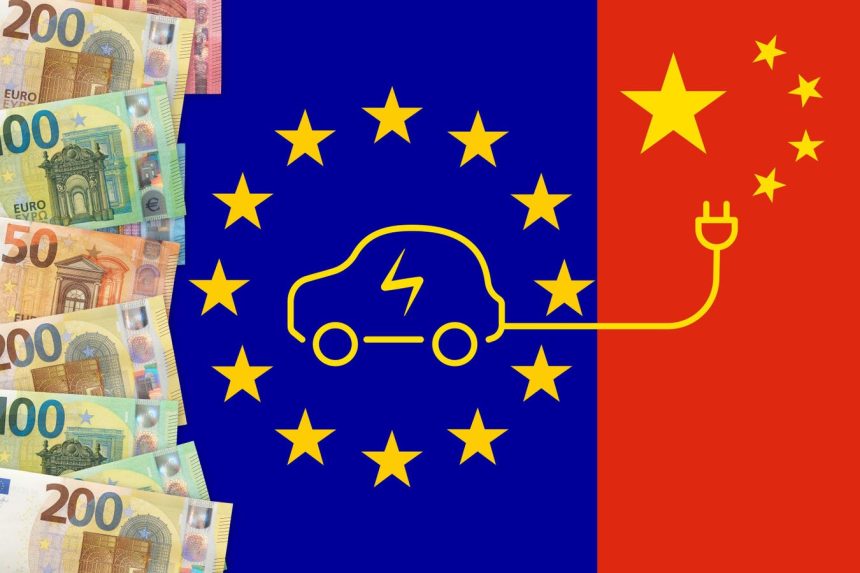Europe’s car buyers are retreating from the market, worried by high prices and a deteriorating financial background. As sales weaken, manufacturers, led by Volkswagen, may need to shut factories to maintain profitability.
Sales of electric vehicles have plateaued, just at the time they should be accelerating to meet European Union carbon dioxide elimination rules. Next year, the rules tighten, and are likely to precipitate a crisis. Automakers will have to forgo sales of profitable internal combustion engine-powered vehicles in favor of electric vehicles which are currently too expensive to generate big sales amongst Europe’s average wage earners.
The European Union could have relieved some of the self-induced pressure by watering down the strict regime that demands only electric new cars can be bought by 2035. The European industry doesn’t make enough EVs, but China has an excess. The EU, in defense of its industry, has raised tariffs on Chinese EVs, but that defeats its own anti-ICE campaign.
European Commission President Ursula von der Leyen said after her reelection for a second five-year term Friday the target to end CO2 emitting new cars by 2035 remains. She did hint at the possibility of allowing some sales of ICE vehicles powered by so-called e-fuels after that date.
Meanwhile, sales of sedans and SUVs in Europe are expected to slow to a growth of 4.6% in 2024 to 19.3 million, according to BMI, which calls itself a Fitch Solutions company. In 2023, sales rose a robust 19.2%, as supply chain disruptions normalized allowing carmakers to catch up with a backlog.
“The moderation in growth rates will also be influenced by elevated borrowing costs, which are starting to impact the broader economy. Although inflationary pressures have receded, we expect demand to moderate in 2024,” BMI said in a report.
BMI doesn’t think China tariffs will do much to staunch its EV sales.
“The recent tariffs introduced by the EU on Chinese EVs will do little to stop these vehicles from entering the European market. Indeed, the introduction of Chinese EVs is expected to offer consumers more affordable EV options, which could stimulate demand,” BMI said.
BMI said sales of EVs have stagnated, rising “a mere” 2% in the first five months of 2024. Potential buyers were put off by constant price cutting which undermined EVs ability to hold their 2nd hand value.
In the first half of 2024 new car and SUV sales in the EU rose 4.5% to just under 5.7 million, according to the European Automobile Manufacturers Association (ACEA). In June, sales of EVs fell 1% to 156,400 for a market share of 14.4%, down from 15.1% the previous year.
GlobalData has been relentlessly cutting its sales forecast for Western Europe. A couple of months ago it was forecasting 4.9% growth. Its latest attempt expects a 1.6% growth in sales in 2024 to 11.74 million. Last year sales boomed 13.9%.
“We have become increasingly cautious on the full-year result as vehicle prices remain high and interest rate cuts will be modest, even though monetary easing from the ECB has now begun. However, we continue to assume growth for 2024, having seen market expansion in the first half,” GlobalData said in a report.
Western Europe includes the big five markets of Germany France, Britain, Italy and Spain.
Germany is Europe’s biggest market for cars, and according to IFO Business Surveys, the business climate deteriorated slightly in June.
“Like the German economy in general, the German automotive industry doesn’t seem able to really pick up momentum,” said IFO analyst Anita Woelfl in a statement.
The auto industry faces huge challenges, according to Woelfl, including digitalization, autonomous driving and electromobility.
“The transformation of the German automotive industry is a huge task for manufacturers, particularly suppliers,” Woelfl said.
The weakening of the European industry will present manufacturers with some uncomfortable decisions. VW is thinking about closing a factory in Brussels, which would mark its first plant closure in Europe, according to the Financial Times’ Lex column. That might not be a negative in the long run.
“Fears that carmakers might embark on a renewed drive to regain volumes helps explain why the sector trades at a miserly six times earnings. Closing plants, while painful, may be a signal that the sector is instead grappling with the harsh realities of its predicament,” Lex said.
Read the full article here
















